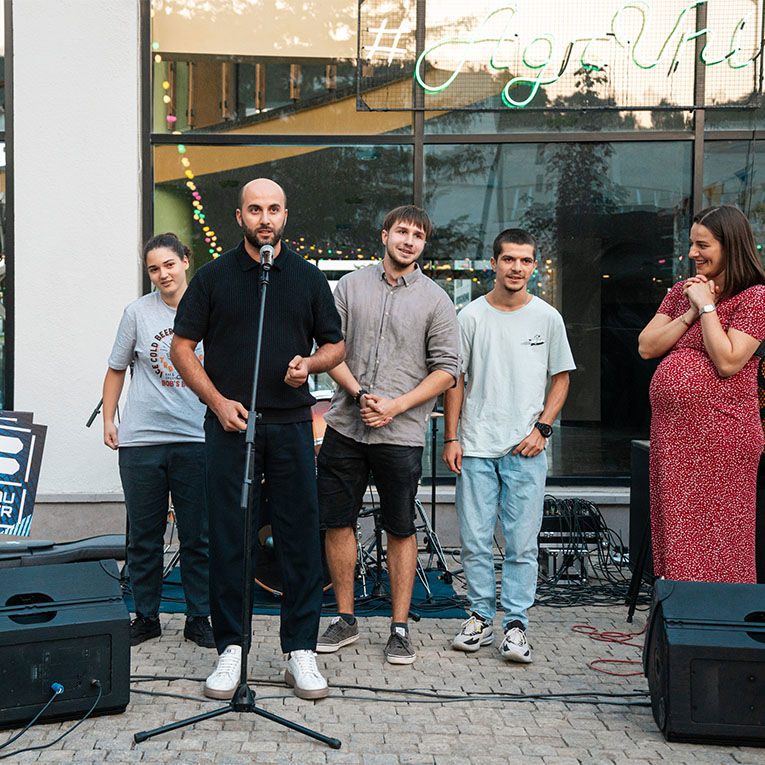School of Engineering Technology
Bachelor’s Program in Mechanical Engineering Description
The objective of the Agricultural University of Georgia Bachelor's Program in Mechanical Engineering is to prepare graduates who possess comprehensive knowledge in areas such as machine mechanics, mechatronics, automotive calculations, internal combustion engines, automated systems, hydraulic systems, and machine parts.
Graduates will gain an understanding of materials and manufacturing processes used in mechanical engineering, and will develop the engineering skills necessary to address and resolve challenges in the field.
The program is designed to provide a strong foundation in both general engineering and specialized disciplines. This integration ensures that graduates are well-equipped to meet learning outcomes and remain competitive in the job market.
Students will learn the principles for effective use of machines and devices, understand engineering problems and their solutions, and study engineering technologies and their characteristics. They will also become proficient in using computer and mathematical methods, as well as CAD/CAM systems. By the end of the program, students will be capable of designing, modernizing, and operating various mechanical systems and projects, as well as determining the resources required for these projects.
Upon successful completion of the 4-year program, the graduate is awarded the qualification - Bachelor of Mechanical Engineering.
Action-Based Learning
Approximately half of the credits in the Bachelor’s Program in Mechanical Engineering (240 credits) are dedicated to developing professional practical skills. The program emphasizes laboratory and practical studies, employing a learning-by-doing approach. This method allows students to learn the profession through hands-on work, where they complete practical tasks and experiments independently. Additionally, practical and laboratory classes are conducted in small groups of no more than 20 students, which in turn positively impacts learning outcomes.
Areas of Employment
After completing the Bachelor's Program in Mechanical Engineering, graduates will be equipped to pursue employment in various sectors, including:
- Organizations utilizing automated electro-mechanical lines and devices
- Relevant specialized organizations within the mechanical engineering field
- Educational and research institutions
Curriculum
The curriculum for the Bachelor's Program in Mechanical Engineering consists of 240 credits, allocated across the following modules:
- University General Education - each student enrolled in the university's bachelor's programs, in addition to specialized subjects, also takes general subjects, contributing to the elevation of general education and the expansion of their field of interests.
- Foundational Education in the Field of Study - this module encompasses fundamental subjects necessary for studying the field, such as Calculus, Differential Equations, Probability and Statistics, Theoretical and Laboratory courses in Physics, Theoretical and Laboratory courses in Chemistry, and Fundamentals of E
- Core Education in the Field of Study - this module encompasses the fundamental theoretical, practical, and laboratory courses essential for studying the field, including Engineering Graphics, Theoretical Mechanics, Technical Modeling, Fundamentals of Heat Transfer, Thermodynamics, Hydraulics, Automatic Control Systems, Machine Parts, Electromechanic, Mechanisms and Machines Theory and others.
- Practical Education - this module includes the subject Internship in an Organization, within which students complete internships or work in various organizations. At the end of the semester, students prepare a brief report detailing their work experience and how they applied the knowledge and skills acquired at the university in different situations.
- Elective Courses - students have the flexibility to choose additional courses based on their interests. They also have the option to pursue an additional 15 credits of courses outside the program requirements at no extra cost.
Code:
0050104 Copied!
Copied!
Seats Quantity 75
| National exam | Weight | Acceptable Places | Minimum Score |
|---|---|---|---|
| ქართული ენა და ლიტერატურა | 4 | ||
| უცხო ენა | 2 | ||
| Optional exam | |||
| ან მათემატიკა | 6 | 65 | 60% |
| ან ფიზიკა | 6 | 10 | 65% |
Subjects
ქართული ენა და ლიტერატურა
Subject Weight
4Acceptable Places
Minimum Score
უცხო ენა
Subject Weight
2Acceptable Places
Minimum Score
ან მათემატიკა
Subject Weight
6Acceptable Places
65Minimum Score
60%ან ფიზიკა
Subject Weight
6Acceptable Places
10Minimum Score
65%About the school
About the School
The Agricultural University of Georgia School of Engineering Technology offers 7 accredited programs:
- Bachelor’s Program in Electronic and Computer Engineering
- Bachelor’s Program in Mechanical Engineering
- Bachelor’s Program in Construction Engineering
- Master’s Program in Electronic and Computer Engineering
- Master’s Program in Construction Engineering
- PhD Program in Engineering
- PhD Program in Mechanical Engineering
The programs of the School of Engineering Technology have been developed with modern engineering requirements in mind, drawing from the programs of leading international universities such as Michigan (USA), Missouri (USA), California (USA), and Munich (Germany).
These programs emphasize laboratory and practical studies, utilizing a learning-by-doing approach. This means that students gain hands-on experience by working individually and completing practical tasks independently. Practical and laboratory classes are conducted in small student groups, which in turn positively impacts learning outcomes.
A significant number of the faculty at the School of Engineering Technology are actively involved in research, including major international projects, within the scientific institutes of the Agricultural University of Georgia. This involvement provides students with valuable opportunities to participate in scientific research.
Additionally, the School maintains close ties with the Jülich Scientific Research Center in Germany, offering students the chance to engage in cutting-edge, international-level research.

02 May 2025
ნიკა ფუტკარაძემ სწავლა გააგრძელა დარმშტადტის ტექნიკურ უნივერსიტეტში

28 November 2024
ნოდარ ვაშაყმაძე სწავლას აგრძელებს Budapest University of Economics and Technology-ში

26 September 2024
ბაუმერმა პირველკურსელებს სასწავლო გრანტი გადასცა

16 September 2024
დემეტრე რამიშვილი ისწავლის Budapest University of Technology and Economics-ში
Dean

Head of the program







